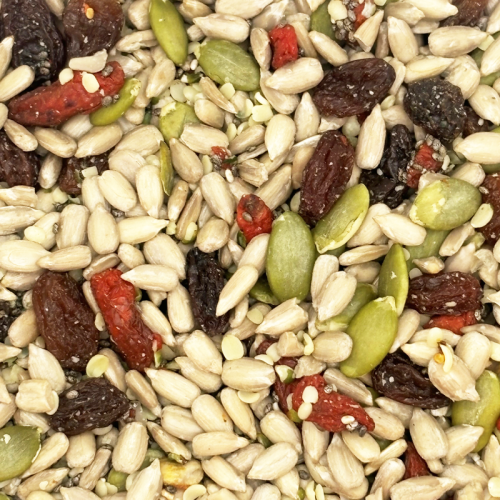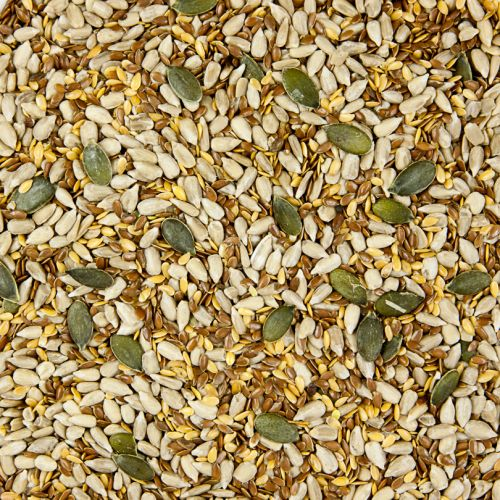Discover the Power of Seeds: A Nutritional Guide by Grape Tree
Seeds are often overlooked, yet they are one of nature's most incredible gifts. Packed with nutrients, they offer a wealth of benefits for our health and well-being. At Grape Tree, we are passionate about providing you with the highest quality seeds that not only enhance your meals but also contribute to a healthier lifestyle in this guide, we’ll explore different types of seeds, their nutritional benefits, how to incorporate them into your diet, and tips for storage and selection.
What Are Seeds?
Seeds are the reproductive structures of flowering plants. They contain the genetic material needed for the growth of a new plant, but they also serve as a concentrated source of nutrition. Seeds are loaded with proteins, healthy fats, vitamins, and minerals, making them an excellent addition to any diet.
Types of Seeds
At Grape Tree, we offer a diverse range of seeds, each with unique nutritional profiles and health benefits. Here are some popular types:
1. Chia Seeds
Chia seeds are tiny black or white seeds that are rich in omega-3 fatty acids, fibre, protein, and various micronutrients. They absorb water and form a gel-like consistency, making them perfect for puddings, smoothies, and as an egg substitute in baking.
2. Flaxseeds
Flaxseeds are another great source of omega-3 fatty acids and are known for their high lignan content, which has antioxidant properties. They can be ground and added to smoothies, oatmeal, or used in baking to enhance the nutritional value of your meals.
3. Pumpkin Seeds
Also known as pepitas, pumpkin seeds are rich in magnesium, iron, and zinc. They have a delicious nutty flavour and can be eaten raw, roasted, or added to salads, granola, or trail mix.
4. Sunflower Seeds
Sunflower seeds are a great source of vitamin E, healthy fats, and protein. They make a crunchy addition to salads, granola bars, or simply as a healthy snack.
5. Sesame Seeds
Sesame seeds are rich in calcium and iron, and they contain beneficial compounds like sesamin and sesamolin. They can be sprinkled on top of dishes, blended into dressings, or used to make tahini.
6. Hemp Seeds
Hemp seeds are an excellent source of plant-based protein and contain all nine essential amino acids. They are also rich in healthy fats and can be added to smoothies, salads, and yogurt for a nutritional boost.

Nutritional Benefits of Seeds
Seeds are nutritional powerhouses, and including them in your diet can offer numerous health benefits:
1. High in Nutrients
Seeds are packed with essential nutrients, including vitamins, minerals, and antioxidants. For instance, chia seeds are high in calcium, while pumpkin seeds are rich in magnesium and zinc.
2. Heart Health
Many seeds, such as flaxseeds and chia seeds, are excellent sources of omega-3 fatty acids, which can help reduce inflammation and lower the risk of heart disease.
3. Weight Management
The fibre and protein content in seeds can help you feel fuller for longer, aiding in weight management. Incorporating seeds into meals can help control hunger and cravings.
4. Digestive Health
Seeds are high in fibre, which is essential for a healthy digestive system. Consuming fibre-rich foods can promote regular bowel movements and prevent constipation.
5. Antioxidant Properties
Seeds like flaxseeds and pumpkin seeds contain antioxidants that can help protect your body from oxidative stress and reduce the risk of chronic diseases.
How to Incorporate Seeds into Your Diet
Adding seeds to your diet is easy and versatile. Here are some simple ideas to get you started:
1. Breakfast Boost
Sprinkle seeds on top of your breakfast cereal, oatmeal, or yogurt for added crunch and nutrition.
2. Smoothies
Add a tablespoon of chia seeds, flaxseeds, or hemp seeds to your morning smoothie for a nutritional boost.
3. Baking
Incorporate seeds into your baking recipes, such as bread, muffins, and granola bars. They add texture and enhance the nutritional content.
4. Salads and Bowls
Top your salads or grain bowls with a mix of seeds for extra flavour and crunch. Pumpkin seeds and sunflower seeds work particularly well in salads.
5. Snacks
Enjoy seeds as a healthy snack. You can eat them raw, roasted, or mixed with nuts and dried fruits.
Storing Seeds
To keep your seeds fresh and maintain their nutritional value, proper storage is essential:
1. Cool and Dry
Store seeds in a cool, dry place, away from direct sunlight. A pantry or kitchen cupboard is usually ideal.
2. Airtight Containers
Use airtight containers to prevent moisture from getting in. Glass jars or resealable bags work well.
3. Refrigeration
For long-term storage, consider keeping seeds in the refrigerator or freezer. This helps preserve their freshness and nutritional value.

Selecting Quality Seeds
When purchasing seeds, quality matters. Here are some tips for selecting the best seeds:
1. Cheque for Freshness
Look for seeds that have a recent harvest date. Fresh seeds are more likely to have better flavour and nutritional content.
2. Read Labels
Choose seeds that are organic and non-GMO when possible. This ensures that you are getting high-quality products without harmful chemicals.
3. Buy in Bulk
Consider buying seeds in bulk from reputable suppliers like Grape Tree. This can be more cost-effective and ensures you have a variety of seeds on hand.
Conclusion
Seeds are a fantastic addition to your diet, providing a multitude of health benefits and enhancing the nutritional value of your meals. At Grape Tree, we offer a wide range of seeds to suit your needs, from chia and flaxseeds to pumpkin and sunflower seeds. With their impressive nutrient profiles and versatility, seeds are truly nature's superfoods. Start incorporating them into your daily meals today, and enjoy the delicious flavours and health benefits they have to offer!
For more information and to explore our wide selection of seeds, visit Grape Tree. Happy snacking!
Comments
Post a Comment